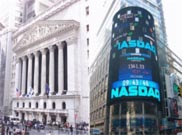Stocks surge in US, world, on promise of US mortgage bailout
 New York - Stocks finished their week-long roller coaster ride on the US financial crisis just about where they started, with the three major US indices Friday making a second day of huge rebounds.
New York - Stocks finished their week-long roller coaster ride on the US financial crisis just about where they started, with the three major US indices Friday making a second day of huge rebounds.
Stock indices careened up and down through the week by as much as 4 per cent a day over a major bankruptcy and bank merger and as the US government bailed out the insurance giant American International Group Inc.
The interconnected world's markets rode along for the wild ride.
But by Friday, the US government signalled the end to its company- by-company management of the year-long mortgage credit crisis and said it would instead formulate a comprehensive plan to intervene and buy up bad mortgage debts across the board to unlock frozen credit lines.
Shares rallied in the US as well as around the world, buoyed by rising financial stocks which regained the huge percentage losses suffered during the week.
The Dow Jones Industrial Average surged another 368.75 points, or 3.35 per cent, to 11,388.44, after Thursday's 3.86-per-cent gain. The broader Standard & Poor's 500 Index jumped 48.57 points, or 4.03 per cent, to 1,255.08, after jumping 4.33 per cent the day before. The technology-heavy Nasdaq Composite Index shot up 74.80 points, or 3.40 per cent, to 2,273.90, after gaining 4.78 per cent on Thursday.
Bloomberg financial news service said it was part of the biggest two-day global rally in 38 years.
The Dow Jones was down by 0.3 per cent for the week over market close last Friday. The S&P was up by 0.3 per cent and the NASDAQ was up 0.6 per cent for the week.
London's leading share index, the FTSE, rocketed 8.84 per cent, its largest one day gain ever since its founding in 1984. Brazil's Bovespa was up 9.57 per cent, Dow Jones Euro Stoxx were up 8.42 per cent, Japan's Nikkei was up 3.76 per cent and Hong Kong's Hang Seng was up 9.61 per cent, Bloomberg reported.
India's benchmark Sensex stock index gained 5.46 per cent.
The recovery came starting late Thursday as US officials got out the word they were launching the massive intervention and were meeting with Congressional officials to discuss the way forward.
Friday morning, US Treasury Secretary Henry Paulson officially announced the vague outlines of a comprehensive plan to remove troubled assets from the balance sheets of financial companies. He called for speedy Congressional approval, after details were worked out over the weekend, before Congressional recess on September 26.
US President George W Bush said the plan was needed to rescue the economy from collapse and unblock the credit freeze.
Paulson and Federal Reserve Chairman Ben S Bernanke Friday also launched immediate measures to back money market mutual funds and make more money available for loans to consumers.
The Securities and Exchange Commission banned short sales of financial firms, a stock-trading technique blamed for some of the rapid market down-slide.
Shares in Washington Mutual Inc, the savings and loan firm that was seen as next on the precipice of the crisis, rallied 42 per cent. Three companies - JP Morgan Chase & Co, Citigroup Inc and Wells Fargo & Co - may be interested in bidding for WaMu, as it is called, Bloomberg financial news service reported. A fourth company, Banco Santander SA, was also interested, the London Financial Times reported.
Shares in insurer American International Group Inc (AIG) rallied 43 per cent. AIG was bailed out by the US government earlier this week to the tune of 85-billion-dollars in a two-year loan. Several sovereign wealth funds may try to derail the government takeover by helping to repay the federal loan to the company, the Wall Street Journal reported citing an unnamed source.
In addition to the AIG takeover, this week's stunning financial news included Lehman Brothers Holdings Inc's declaration of its 600- billion-dollar bankruptcy and Bank of America's takeover of Merrill Lynch & Co for 50 billion dollars.
The temporary curb on the stock-trading practice of short-selling was put into place not only in the US but also in Britain and Australia on certain kinds of stocks.
In some short-selling, traders sell shares they don't actually own in the hope of buying them later at a cheaper price.
Market oversight officials in the US, Britain and Australia limited the practice out of concern that some individuals were spreading false and misleading information about listed companies to provoke fire sales of securities at low prices.
The US currency stood at 69.13 euro cents, down from 69.74 euro cents on Thursday. The dollar rose against the Japanese yen to 107.45 from 105.58 yen on Thursday. (dpa)